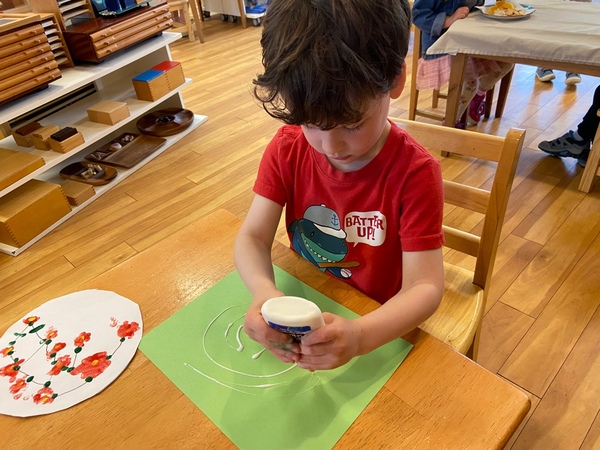(858) 759-0631
Dr. Montessori observed that children go through sensitive periods during which they are mainly disposed to develop specific abilities. Sensorial exploration is a sensitive period of the toddler years: They want to touch, see, hear, smell, and taste everything! Through sensorial exploration, young children learn about the fantastic world around them.
You may have noticed your child turn at the sound of every airplane, notice small insects, explore objects with his mouth, and want to feel water pass through his fingers. Dr. Montessori designed her learning environments to appeal to this drive for exploration within young children.
Toddlers in our Montessori classrooms spend much time exploring with all their senses. They taste and smell foods during food prep activities. They enjoy the feel of water and suds on their hands while cleaning. They pound pegs into clay. They touch the flowers they arrange. They make messy, big, colorful art on an easel. They go on nature explorations on our playground and the garden.
Throughout all these experiences, we "teachers" provide them with the words to describe their experiences: "Look at how the sunlight makes the purple of this flower petal bright!" and "Feel the little bumps in the orange peel. Can you smell it when we cut it? That smells like citrus."
Encouraging Exploration at Home
Toddlers are so much fun—because everything is new and exciting! Here are some tips on how to enjoy this time:
- Explore the world and talk about it.
- Focus on one sense at a time. Toddlers are easily overwhelmed. Background noise (think a TV running) can easily distract them. So does clutter—or bright colors everywhere—or too much change. Being a sensorial explorer at this age means doing one thing very intensively. So turn on the music and dance. Get colored paper and glue it into a mosaic. Just don't do them both at the same time!
- Help them build strong bodies. When you start young and slow down, your toddler may surprise you with what a great walker she is! Find times to leave the stroller at home. Walk where your little person wants to go. "Follow the child" is an excellent Montessori idea to remember here! By the time your child is three, she rarely needs to be in a stroller: her feet should carry her where she needs to go!
- Minimize screen time. Many well-meaning parents invest in iPad apps or buy DVDs with educational content. We support the use of quality educational software with elementary-age children. For toddlers, however, we recommend minimizing screen time as much as possible because it may harm rather than help:
Screen time can crowd out beneficial activities. There's only so much time in a day. More time glued to a screen means less time interacting with an adult, using little hands and strengthening muscles, and refining senses.
Children become overstimulated. Little brains can quickly get addicted to the fast pace and quick rewards of much of modern screen-based entertainment. They get habituated to speed and find it harder to engage in the slow, careful activities they need to develop their potential.
Your child will benefit as you eliminate screen time—and so will you, when, as a preschooler, they can entertain herself without the crutch of screens!
-Cricket Teacher

